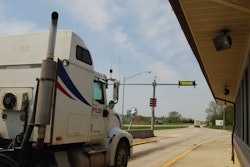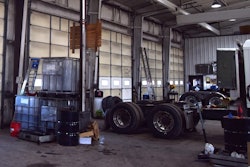Since Overdrive published the above poll here at the website and began collecting readers' thoughts about a speed-limiter mandate, currently in the early stages of pursuit by the Federal Motor Carrier Safety Administration, it's been clear that objections to a mandate proliferate among the readership, most centered on safety concerns. Chiefly, readers worry about the potential for uniform speed-limiting of heavy-duty trucks to dramatically increase the interactions between impatient passenger-vehicle drivers and the professionals, the intersection at which so many of today's truck-involved accidents happen.
Georgia-based owner-operator Gary Shaw echoed the thoughts of the 79% of readers who objected to the mandate categorically when he called it "the dumbest idea I’ve ever heard," simply put. A speed limiter mandate used at a low speed setting, in particular, Shaw believes, will also exacerbate what he sees as a problem among fellow professional drivers "already trying to race the clock" to get as many miles in as possible within allowed time under the hours of service. And "if everybody's at sixty miles an hour," he predicted, rolling roadblocks are likely to be the result.
Marshall Blasingame, commenting under the above poll at OverdriveOnline.com, also questioned the need for a limiting technology given "we have speed limits on the road," he noted. He follows them, he added: "I've been driving 45-plus years, own my own truck, and have a very clean record. I have no speed limiter on my truck." Under a mandate, he offered to regulators, "you think you have congestion now? It'll be ten times worse."
Expect rear-end collisions from four-wheelers to spike under such a mandate, Shaw said. There's a reason, ultimately, truck-involved crashes fell off in 2020 when four-wheelers were on the highways in much smaller numbers, particularly in the early COVID pandemic months. A recent analysis by Overdrive and sister business unit RigDig showed truck-involved crashes per power unit in operation fell by a dramatic 13% from 2019 to 2020, measured for the full calendar year. Crashes per carrier-reported miles run fell by around 10%, too.
Much, though not all of those gains were erased looking at calendar year 2021, when by and large the general public returned to the nation's roads in earnest. “If all trucks are going the same speed," suggested John Cochran, one of more than 10,500 commenters as yet responding to the FMCSA's recent request via the Federal Register, even more risky behavior by the general public is likely to result.
"Cars will get mad and try to get around no matter the risk they take,” wrote Cochran. “It's a very bad idea and will further cripple the industry. So many of us will leave the industry and park the trucks. You can't get the supply chain caught up now. What do you think will happen with fewer trucks on the road? Stop trying to control our every move. We aren't robots.”








